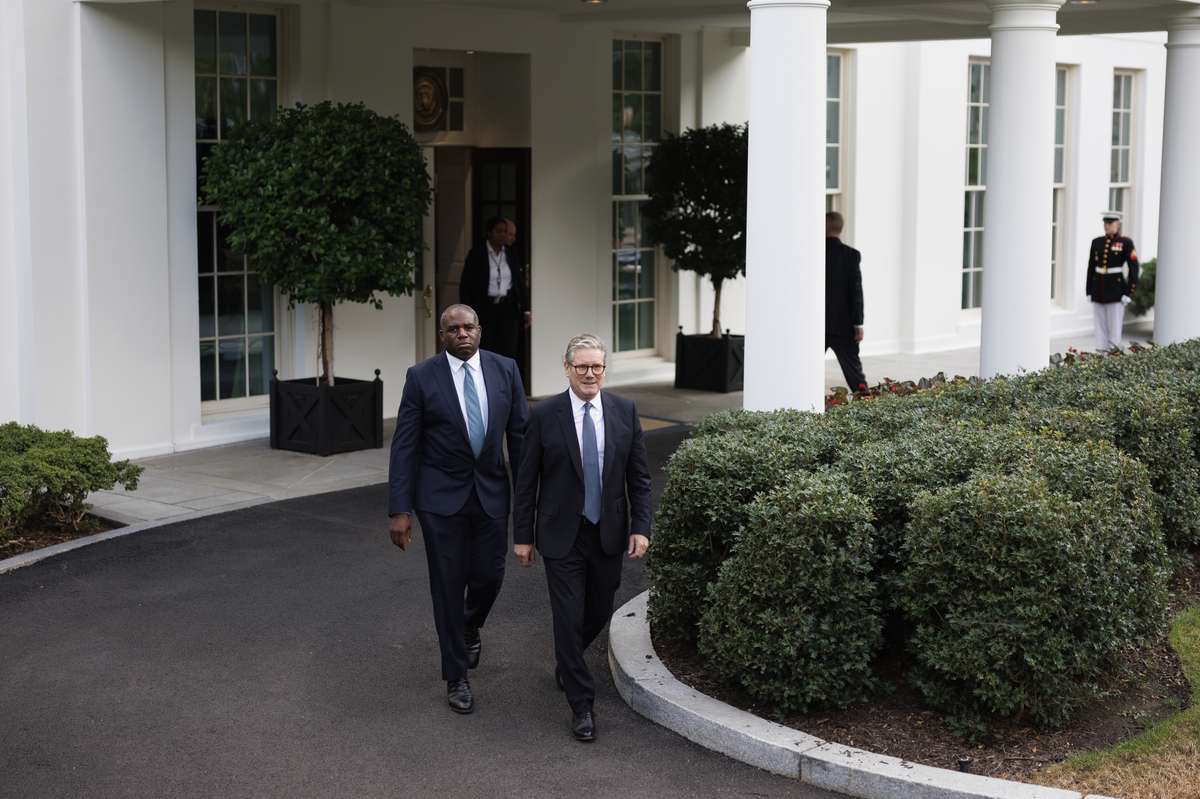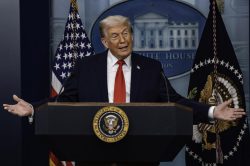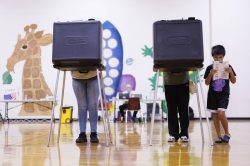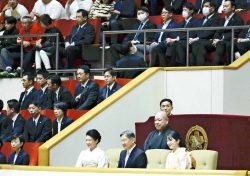
British Prime Minister Keir Starmer, right, and Foreign Secretary David Lammy leave the White House after meeting with President Joe Biden on Sept. 13.
12:38 JST, November 26, 2024
LONDON – The Americans and British, raising a glass, love to praise their “special relationship,” but it is a lopsided affair, to be honest, and Prime Minister Keir Starmer and his government are worried about how it will go with President-elect Donald Trump.
The alliance between the two countries, and the relationships between their leaders, can be world-changing. Think Roosevelt and Churchill. Reagan and Thatcher. Or Clinton (then Bush) and Blair, for better or worse. Even former British prime minister Boris Johnson had a bit of a thing with Trump, both of them alpha disrupters with famous heads of hair.
Starmer starts off on the back foot – at a time when Britain is still searching for trading partners and its place in the world, post-Brexit. When Europe is fractured, adrift, aging, and the Western alliance looks a little shaky, does Britain tilt toward the continent? Or the cousins?
Starmer and Trump could hardly be more different. Whereas Trump has moved America to the right, Starmer is a self-proclaimed socialist and beacon for a more assertive center left, having bested the Conservative Party in a landslide election in July.
Trump is a showman. Starmer is dismissed as a bit boring. He talks of favoring a “government of service” over the “politics of performance.” Starmer has warned his European colleagues that “delivery and honesty is the best way of dealing with the snake oil of populism and nationalism.”
Worth noting, too: Starmer is a former prosecutor. Trump has spent his political career being prosecuted.
“Look, I don’t think they are going to be friends,” said Tom Baldwin, one of Starmer’s biographers.
Baldwin said he doesn’t think Starmer will make the mistake of being obsequious, or trying to buddy up to the president-elect. “He will let Trump be Trump,” he said.
If Trump is “America First,” then Starmer might hew toward a quieter version of “Britain first,” Baldwin suggested. Starmer will argue his case. “He is all about the evidence,” he said.
Jonathan Monten, director of the international public policy program at University College London, said it is a really interesting question how the two will get along. “Starmer is an unknown to Trump. They don’t have any personal history,” he said. “With Trump, it’s so transactional and so personality-driven. It’s hard to predict.”
But there is some awkward history with Starmer’s Labour Party.
The party helped organize 100 members to volunteer for the Kamala Harris campaign, with a focus on the swing states. The Trump campaign filed a legal complaint with the U.S. Federal Election Commission, claiming that it was foreign interference and reminding Starmer of the British surrender at Yorktown in 1781.
Starmer said Labour members had been involved in “their spare time” and on a volunteer basis, as is typical during U.S. campaigns. He said the Trump campaign’s complaint would not sour his relationship with the former president.
But there is also the inconvenient memory that David Lammy, when he was a backbencher in Parliament in 2018, described Trump as “a woman-hating, neo-Nazi-sympathizing sociopath.”
Today, Lammy is Britain’s foreign secretary.
“You couldn’t wish for a worst first date,” said Leslie Vinjamuri, director of the U.S. and the Americas program at Chatham House, a London think tank. “The starting point isn’t great.”
If it were one negative comment, maybe forgotten, let bygones be bygones. But the news media on both sides of the Atlantic have resurrected all the quotes from Labour leaders dumping on Trump. Just one example among a dozen: Starmer’s health secretary, Wes Streeting, in 2017 called Trump “an odious, sad, little man.”
Lammy, though, has turned on the charm. He met with Trump before the election and said he did not think his past comments would be a problem. He told the BBC the incoming president was “a very gracious host” who offered him “a second portion of chicken” during their meal.
Starmer, with Lammy in tow, met Trump for the first time at a dinner at Trump Tower during the U.N. General Assembly meeting in September. The three reportedly talked about Trump’s fondness for Scotland, where Trump’s mother was born. Before the sit-down, Trump congratulated Starmer on his win, saying the prime minister “ran a great race, he did very well. … He’s very popular.”
On the big issues, though, there may be friction.
Starmer sat down with Chinese President Xi Jinping at the Group of 20 summit in Brazil last week and said Britain seeks a “strong” relationship with China, focused on international stability, climate change and economic growth.
Trump is going tougher on Beijing, threatening huge tariffs.
On the climate crisis, Starmer loves wind turbines. Trump, famously, does not.
Starmer would be less willing than Trump to give Israel carte blanche for the wars in Gaza and Lebanon.
In September, he broke with the Biden administration by announcing that Britain was suspending some arms export licenses to Israel because of a “clear risk” the weapons may be used to facilitate a serious violation of international humanitarian law. Later, exemptions were made for components of F-35 fighter jets and other materiel.
Ukraine could also be a difficult conversation for Starmer and Trump.
Starmer is a stalwart backer of President Volodymyr Zelensky. At the G-20, on the 1,000-day anniversary of Russia’s invasion, Starmer said President Vladimir Putin was “the author of his own exile” from the group, and told Russia to “get out of Ukraine.”
Trump has been reluctant to say whether Ukraine should win. During the campaign, he said he could end the war within 24 hours, without providing details.
Trump might approve of Starmer’s vow to make “wealth creation” the centerpiece of his new government, as the prime minister struggles to turn around Britain’s low productivity and sluggish growth.
On the other hand, Britain’s Labour Party government just unveiled the biggest tax increase in a generation.
After Britain left the European Union, Starmer’s predecessors sought a sweeping trade deal with the United States. It never happened. One reason: British farmers and consumers are wary of accepting and competing with chlorinated chicken or hormone-fed beef from America.
Stephen Moore, who served as an economic adviser to Trump when he was president, told the BBC that Britain “really has to choose between the Europe economic model of more socialism and the U.S. model, which is more based on a free enterprise system.”
Moore said the United Kingdom was “caught in the middle of these two forms of an economic model. I believe that Britain would be better off moving towards more of the American model of economic freedom” if it wants to avoid the higher tariffs that Trump may introduce.
An early test of the U.S.-U.K. relationship under Trump could involve what’s known as the Chagos Islands deal.
Starmer’s government agreed last month to hand over sovereignty of the disputed islands in the Indian Ocean to Mauritius. The move was celebrated in some corners as the end of “Britain’s last African colony.”
The United States has a vested interest, because it shares a military base with Britain on the island. The agreed-upon deal would allow that base to remain under U.K. and U.S. jurisdiction for the next 99 years. But critics, including secretary of state pick Marco Rubio, a Republican senator from Florida, say it reads weak and could embolden China.
Nigel Farage, leader of the Reform Party in Britain who is close to Trump, suggested that the president-elect would view the move with “outright hostility.”
But Lammy told the New Statesman that he was confident the new administration would support it. “Donald Trump knows what a good deal looks like, and this is a good deal,” he said.
Top Articles in News Services
-

Prudential Life Expected to Face Inspection over Fraud
-

South Korea Prosecutor Seeks Death Penalty for Ex-President Yoon over Martial Law (Update)
-

Trump Names Former Federal Reserve Governor Warsh as the Next Fed Chair, Replacing Powell
-

Suzuki Overtakes Nissan as Japan’s Third‑Largest Automaker in 2025
-

Japan’s Nikkei Stock Average Alls from Record as Tech Shares Retreat; Topix Rises (UPDATE 1)
JN ACCESS RANKING
-

Univ. in Japan, Tokyo-Based Startup to Develop Satellite for Disaster Prevention Measures, Bears
-

JAL, ANA Cancel Flights During 3-day Holiday Weekend due to Blizzard
-

Japan Institute to Use Domestic Commercial Optical Lattice Clock to Set Japan Standard Time
-

China Eyes Rare Earth Foothold in Malaysia to Maintain Dominance, Counter Japan, U.S.
-

Japan, Qatar Ministers Agree on Need for Stable Energy Supplies; Motegi, Qatari Prime Minister Al-Thani Affirm Commitment to Cooperation


























